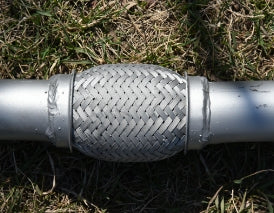Your ride's exhaust system is more complex than you may think – it's a lot more than a series of pipes designed to expel exhaust gases. Car junkies and performance enthusiasts know that all the components of their exhaust system play an essential role in a vehicle's overall performance and sound. Mufflers and resonators, for example, play a huge role in customizing exhaust notes. But what is the difference between a muffler and a resonator?
While both components are designed to affect the sound of your ride, they each have distinct properties and functions that set them apart. This article will explore the differences between resonators and mufflers to give you a better understanding of how to shape your vehicle's sound to suit your unique needs. Whether you're looking for a deep growl, a mighty roar or a completely silent drive, knowing these differences can help you get the most out of your system.
Table of Contents
|
> CORSA Pro Series Mufflers and Resonators Are the Best Choice for Your Sound |
What Is a Muffler?
Before we can get into the muffler vs. resonator talk, let's look deeper into each component, starting with the muffler. Your muffler sits near the rear of the exhaust system and is used to moderate its sound. As the name suggests, it "muffles" the sound. Mufflers are integral to all vehicles and largely dictate the sound of your exhaust notes. For many enthusiasts, stock mufflers are far too conservative, thanks to manufacturing costs and sound-level laws. Because of their restrictive design, most performance enthusiasts upgrade to a performance muffler for a more aggressive sound.

What Does a Muffler Do?
Mufflers are designed to deaden the sound of your exhaust to make sure it isn't obnoxiously loud. We like the power of a ripping exhaust system, but not everyone appreciates it as much as we do. Mufflers are engineered with multiple perforated or baffled chambers that direct exhaust gases and reduce pressure. As your exhaust gases pass through the perforated holes and baffles, the gas expands, and the pressure (and sound level) lessens. Often, mufflers are lined with materials like fiberglass that act as soundproofing to absorb more of the sound waves, emitting less ambient noise.
Types of Aftermarket Mufflers
There are a few different types of mufflers that accomplish sound deadening in different ways, often having very different sound profiles. These include:
- Straight-Through Mufflers: These mufflers consist of a perforated tube surrounded by sound-absorbing material such as fiberglass or steel wool. They allow for a mellow sound at idle but a deep aggressive tone at full throttle.
- Chambered Mufflers: These mufflers consist of a series of chambers with perforated baffles that the exhaust gas must flow through. They can achieve a variety of sounds, from a low rumble to choppy idle.
- Glasspack Mufflers: These mufflers have a straight-through design with a single perforated tube wrapped in fiberglass or steel wool. They are known for producing a distinctive, deep exhaust note.
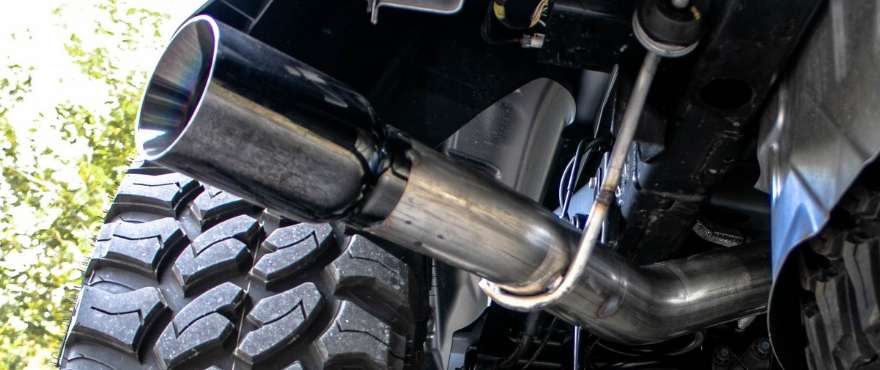
What Is a Resonator?
While mufflers reduce the exhaust volume, resonators are responsible for tuning the exhaust for a more pleasant sound. Found between the catalytic converter and the muffler, resonators are designed to remove the high-pitched or raspy noises from exhaust notes (though they can't do anything to silence the volume).
What Does a Resonator Do?
Resonators are designed to eliminate specific waves at certain sound frequencies. If you like how your exhaust system sounds but hear a lot of annoying buzzes and hums at certain RPMs, a resonator can help fix the issue.
Resonators work by trapping sound waves within their interior. As they bounce around, they hit one another and cancel each other out through a process called destructive interference. Canceling these sound waves eliminates those annoying noises, providing a better overall exhaust note. One of the best uses of resonators is to complement your existing setup. For example, if you've got the perfect exhaust note but still have a persistent exhaust drone at certain RPMs, a resonator can eliminate the drone while preserving the desired note.
Types of Aftermarket Resonators
Like mufflers, there are a few different styles of resonators on the market, though they all commonly feature a tube inside a larger tube along with packing materials. These include:
- Dissipative Resonators: This resonator style comes with fiberglass or metal packing material that absorbs the loud noises from your engine.
- Expansion Chamber Resonators: This style is one of the simpler designs. It's a simple tube with varying diameters that will produce a smoother exhaust note with a lower tone.
- Helmholtz Resonators: These resonators consist of a chamber with a small neck or hole and work by using multiple-size cavities to cancel sound waves and produce a cool buzz.
Find Your Dream Exhaust Notes With CORSA Aftermarket Mufflers and Resonators
If you're looking for a way to upgrade the sound of your ride, look no further than CORSA PERFORMANCE. Our high-quality aftermarket mufflers and resonators can help you achieve the aggressive, deep exhaust notes you've been dreaming of without any annoying drone. Whether you're looking for a subtle improvement or a full-on transformation, our products are designed to help you get the most out of your ride.
Shop All Pro Series Packed Resonators
Resonator vs. Muffler: What's the Difference?
Let's get to the heart of the matter: the difference between resonators and mufflers. While simple components, the key differences between the two can still be confusing. Let's dive deeper into resonators vs. mufflers and examine how they can affect your sound and performance.
The Primary Functions of Mufflers and Resonators
There are some significant differences to consider when it comes to the primary function of a muffler vs. resonator. While mufflers and resonators are both designed to alter exhaust notes, they serve different purposes in the grand scheme of things.
A muffler is designed to reduce the overall volume of sound produced by a vehicle's exhaust system created by the engine. On the other hand, a resonator cancels out precise frequencies of sound. They are designed to resonate with the engine's unwanted noise and create a counter-frequency to cancel it out.
Resonator vs. Muffler Backpressure
Another key difference between mufflers and resonators is how they affect backpressure and performance. Unfortunately, stock mufflers can create a higher level of backpressure within your system due to the chambers and baffles they utilize to reduce exhaust noise. This can have a negative impact on performance, as it can limit the flow of exhaust gases through the system. Thankfully, performance mufflers do an excellent job limiting this unfortunate side effect. In contrast, resonators can actually improve performance by reducing restrictions in the system.
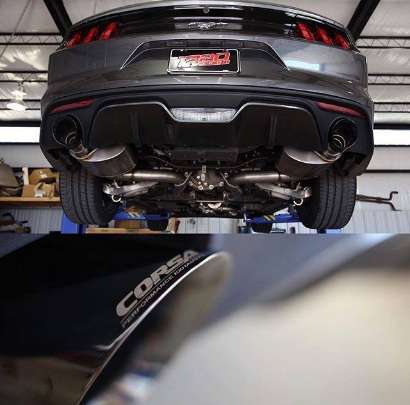
The Difference Between Resonator and Muffler Cost & Maintenance
The cost of mufflers and resonators can vary depending on the style and the brand. However, aftermarket resonators are typically less expensive than performance mufflers. Maintenance costs for both components are usually minimal, as they require no more than occasional cleaning and inspection. Overall, the cost of a resonator vs. a muffler will depend on the specific needs of your ride.
CORSA Pro Series Mufflers and Resonators Are the Best Choice for Your Sound
While we've talked a lot about the difference between mufflers and resonators, we haven't discussed what separates CORSA products from your stock parts. Our Pro Series tuned mufflers and resonators are the best option for fine-tuning your sound, boosting performance and improving your drive.
Unlike standard straight-through, baffled or glasspack mufflers, CORSA PERFORMANCE mufflers benefit from our patented Reflective Sound Cancellation® (RSC®) technology. Each muffler is designed to reduce drone, maximize airflow and produce that iconic aggressive CORSA exhaust note.
Our performance resonators are even more impressive. Designed to work in tandem with our performance mufflers, CORSA resonators utilize high-quality sound suppression and lasting performance to outperform the competition. When it comes to resonators, it's all about acoustic engineering, and CORSA has the best in the industry. With a Pro Series resonator, you can tailor the volume and tone of your exhaust note for a better overall drive.
Check out this short video to get a closer look.
Upgrade Your Exhaust With CORSA's Performance Mufflers and Resonators Today
Now that you better understand the differences between mufflers and resonators, it's time to put that knowledge to use. CORSA PERFORMANCE offers a wide selection of performance mufflers and aftermarket resonators to help you achieve your desired sound. With our top-of-the-line components and expert engineering, you can rest assured that you're getting the best quality products on the market. If you have any questions or need more information, please contact us. Our knowledgeable staff is always here to help you make the right choice for your vehicle.


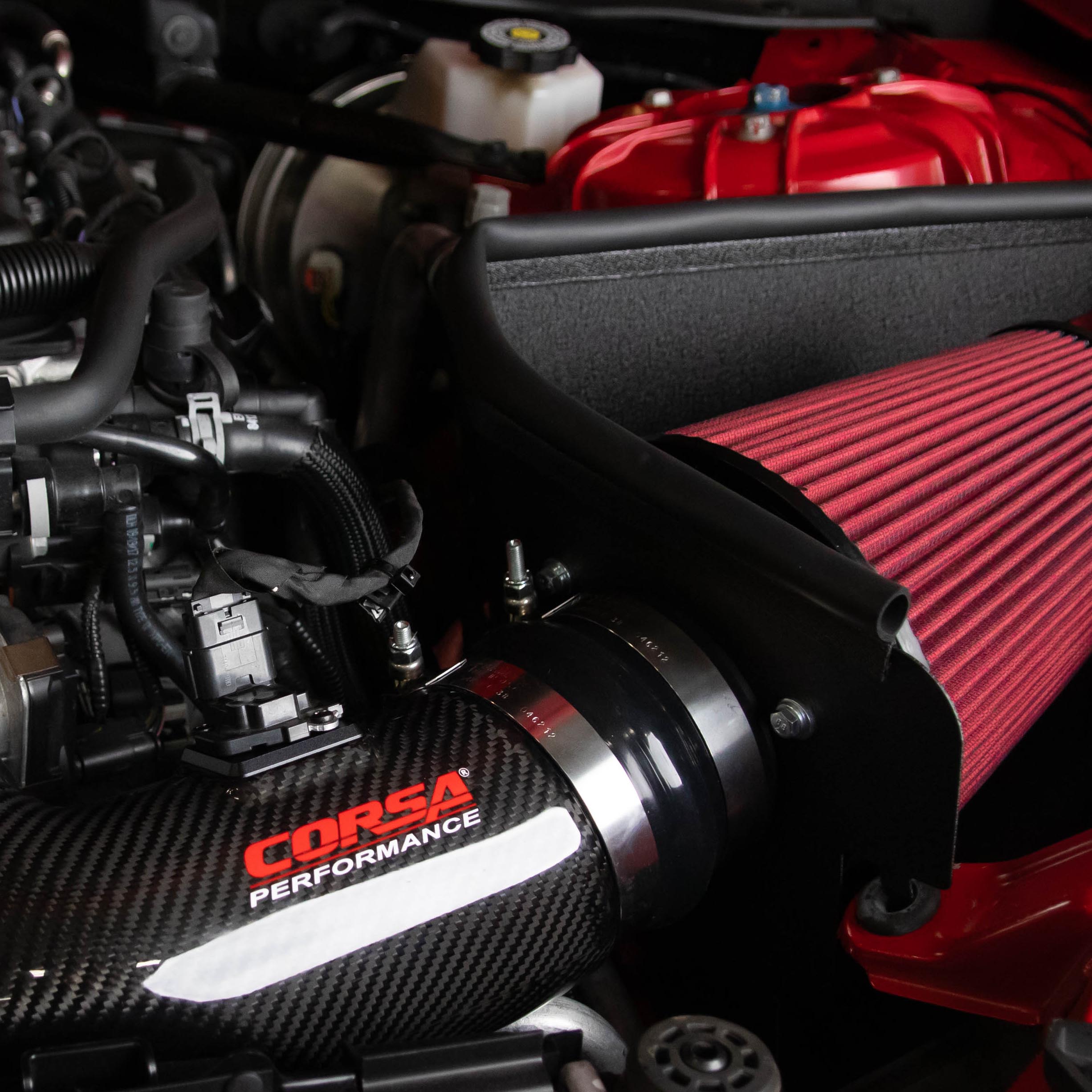
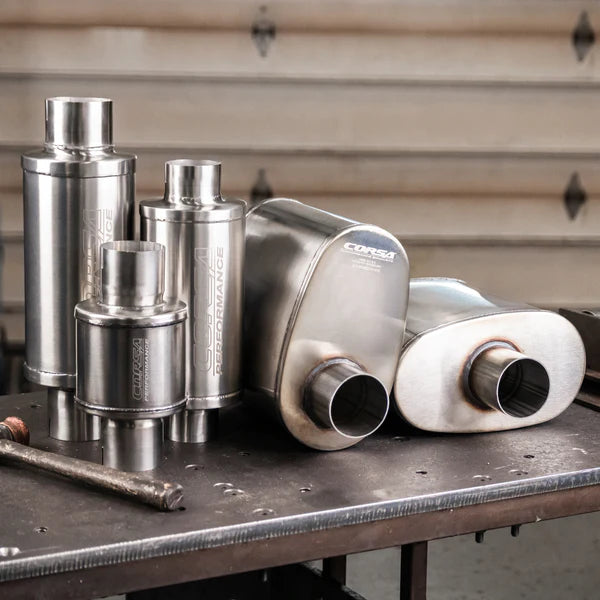


![[OPEN BOX ITEM] 3.0 in Downpipe | 2015-23 Ford Mustang EcoBoost 2.3T (14344)](http://www.corsaperformance.com/cdn/shop/files/14344-2015-2019-ford-mustang-ecoboost-downpipe-3-0-sport-to-xtreme-14344-downpipe-745179021328_63440e1a-d143-4f51-9a01-bbec5072ab45.jpg?v=1688997809&width=104)





![[OBSOLETE] Shielded Box Air Intake | 2011-2015 Cadillac CTS-V 6.2L V8 (415864)](http://www.corsaperformance.com/cdn/shop/products/415864-2011-2015-cadillac-cts-v-6-2l-v8-pro5-air-intake-415864-air-intake-2589524787314.jpg?v=1621866859&width=104)

![Pro Series Muffler (3.0" and 2.5") [MULTIPLE CONFIGURATIONS]](http://www.corsaperformance.com/cdn/shop/products/CP30CTR_lowres_1.jpg?v=1692361215&width=104)








![[CLOSE OUT] Black / CORSA Men's T-Shirt | Exhaust Tips](http://www.corsaperformance.com/cdn/shop/products/IMG_0485_edit_square.jpg?v=1709830722&width=104)
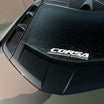

![[CLOSE OUT] Varsity / CORSA Women's Full Zip](http://www.corsaperformance.com/cdn/shop/products/IMG_0456_edit6copy_square.jpg?v=1628686742&width=104)



